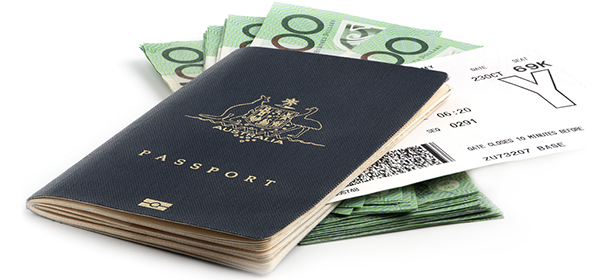Graeme’s Travel SOS is all about how best to handle his finances while travelling – and would like to know if travellers cheques are still a ‘thing’.
Q. Graeme
What’s the best way to manage and access my money while travelling overseas? Can I use my debit card or do I need a credit card? Can you still get travellers’ cheques and how easy is it to make cash withdrawals?
A. Ah, travellers cheques … those where the days, my friend.
I carried a stash of travellers cheques with me on my first overseas trip in the early 70s. I remember strapping them round my waist in a money belt, so terrified that I would lose them and do a George Orwell and be down and out (of cash) in Paris and London. Credit cards existed way back then – actor Karl Malden never left home without his – but I was a student and students couldn’t get a credit card. In fact, my parents didn’t have one, although they did have a strong credit rating. (They were children of the Great Depression and believed in saving for what they wanted – something of a novel concept today.)
Travellers cheques still exist, so someone must be using them, but I put them in the public phone category. Time and technology has passed by both. I’ve just got back from Europe and can’t recall seeing either a public phone booth or signs saying, “We accept travellers cheques”.
Plastic rules the day and the world of travel, especially since the advent of the ‘travel card’. By that I mean a card on which you can load different currencies for use overseas. But convenience comes with a price tag. In the case of travel cards, in the form of fees – lots of them.
Fees vary depending on the card, but here’s a quick run down of what you can be charged when using a travel card: buying the card, loading money, withdrawing money, not using the account, getting a replacement card, using the card in Australia rather than overseas. And I’m sure there are more – we’re dealing with banks and we know how they turn a profit.
For a couple of trips through Asia and Europe several years ago, I did use a specific traveller’s card that I bought and, on which, loaded money, but it didn’t work for me. It might have been me, but I found it wasn’t always accepted in shops or hotels – despite it having the Visa badge – and nor could I always withdraw money from international ATMs. So I ditched it, but not without a struggle. There was, however, an upside. I had US dollars in the account and by the time I figured out how to close the account – that involved loads of internet time and hours ricocheting from one person to another on the phone – our dollar had dived and the difference covered the exit fee I was required to pay for having my money returned to me.
So now I use my normal credit and bank debit cards. Better the devil I know. They’re manageable for me and easily traceable for the bank, which is my main concern in this age of relentless internet fraud. And apart from that little windfall of $10 or so mentioned above, I believe juggling currencies to try to avoid currency fluctuations is a job for professionals. I’m more likely to save money by spending my time researching good, cheap places to eat, drink and stay.
I’m extremely concerned about security and you should be too. Here’s how to make sure your money is safe when travelling:
- For starters, tell the bank what you are doing and for how long. (If you change sim cards on your phone let them know what number you are using and also your email address so you are contactable at all times in case purchases or withdrawals need to be verified.)
- Keep the cards separate. I keep one in my day bag and the other locked in a safe in the room.
- If I need to transfer funds, I do it on my iPad, which has a pin number – never on a public computer even at a good hotel.
- I insist on watching waiters and shop assistants scan my cards when I am paying for goods or services.
- When I withdraw money from international ATMs, I always do so in busy areas and during the day with my hand covering my pin.
- I never use the dedicated credit card to get cash, as it attracts a higher rate than a normal debit card.
- For ease and convenience, and so you are not grappling with your wallet or purse in a crowd, buy currency at your own bank before you leave.
And one final tip, buy a small stash of American dollars in low denominations even if you are not travelling to the US. The greenback talks all languages.
For those who are interested in the fine print of travel cards, visit Choice.com.au
Do you have a travel question for Kay? If so, send it to [email protected]
Related articles:
Travel agents tell all: how to save money on travel
Six common costly travel mistakes
Seven travel money wasters

